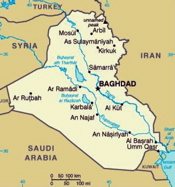Three months ago, the city of Ramadi was dark. The city of 400,000 in western Iraq was completely severed from the country's delicate electrical grid; those who had power got it strictly from generators that hummed all day and night. But then came the much-heralded "Anbar awakening" -- a banding-together of Sunni sheiks and their militias into a loose alliance that fought alongside U.S. and federal Iraqi forces to all but eradicate terrorist cells in Ramadi and other large western towns. As security improved in Anbar province, U.S. Provincial Reconstruction Teams (PRTs) -- some military-led, some commanded by State Department specialists -- moved to restore Ramadi's connection to the national power grid. Now 80 percent of residents have regular power, according to Col. John Charlton, an Army commander in the province. Expectations were that more power would mean more industry, more employment and therefore fewer disaffected residents joining, supporting or simply tolerating extremists in their communities. But it didn't quite work out that way.
Iraq Resconstruction Teams Struggle to Sustain Grassroots Projects

